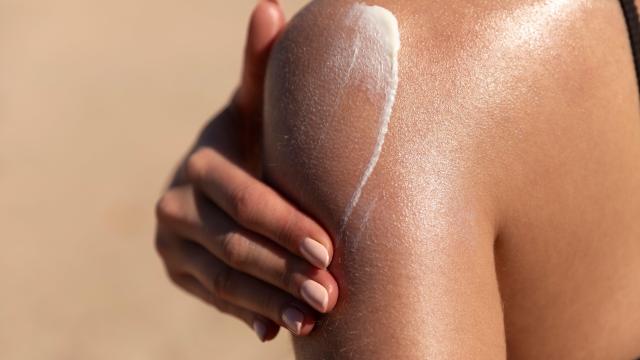Scientists in China say they’ve begun to develop what could be the first of a new and improved generation of sunscreens. In mice, their experimental polymer appeared to provide greater protection against ultraviolet radiation than commercial products. It also wasn’t absorbed through the skin and seemed to be non-toxic to coral, two concerns have arisen in recent years (though whether modern sunscreens actually pose any significant health or environmental risks remains contentious).
The experimental sunscreen compound was developed by researchers at Tsinghua University in Beijing, China. Using a chemical reaction known as the Biginelli reaction, the team created ring-shaped molecules similar to avobenzone, one of the common ingredients used in sunscreens today. Then using another method, they linked the molecules together into different water-soluble arrangements, creating larger molecules known as polymers. Once they had a group of these polymers, they picked out the most promising one based on its ability to absorb the ultraviolet wavelengths that are responsible for sunburns and raising people’s risk of skin cancer.
In subsequent tests with mice, they found that the experimental filter was more effective at preventing UV-related skin burns than avobenzone, oxybenzone. and two commercially available sunscreen products. They also found no evidence that the mice’s skin absorbed the polymer, which they expected due to its larger size. And lastly, when they exposed free-floating algae and coral to the polymer, the algae and coral appeared unaffected. Meanwhile, the coral exposed specifically to oxybenzone developed bleaching — a phenomenon where the coral expel the algae living on them and often die afterward.
“This work presents an initial exploration of biofriendly and coral-friendly polymeric UV filters via a simple multicomponent reaction,” the authors wrote in their paper, published Wednesday in Cell Reports Physical Science.
Several studies in recent years, much like this one, have suggested that oxybenzone and similar chemicals used in sunscreen can bleach coral and hurt marine life. This research has been supported by agencies like National Oceanic and Atmospheric Administration, and it’s even led some places, including Hawaii, to outright ban sunscreens with these ingredients. But there is an ongoing scientific debate over the exact harms posed by these sunscreens to the oceans. Much of the research has been conducted in lab conditions very different from the real world, and at least some scientists have argued that sunscreen chemicals that reach the environment are highly diluted and may only have a negligible effect on coral reefs at worst.
There’s also been recent research suggesting that certain sunscreen ingredients are readily absorbed through the skin into our bloodstream. And some sunscreens have even been recalled recently due to containing higher-than-recommended but relatively small levels of a carcinogen known as benzene. But again, there are some caveats. These studies haven’t shown a link between any health problems and exposure to chemicals absorbed through sunscreen, and not even the researchers involved in those studies have called for people to stop using sunscreens as a result — only for more research and safety testing to be done.
In other words, the possible environmental and health issues surrounding some sunscreens are still speculative. Should the researchers behind this new study continue to develop their experimental UV filter, we might someday have more effective and alternative sunscreens that would appeal to people worried about potential risks. But given the very established risks of UV exposure, it’s better to use any existing sunscreen than to avoid them as a whole — and to cover up and seek shade.
